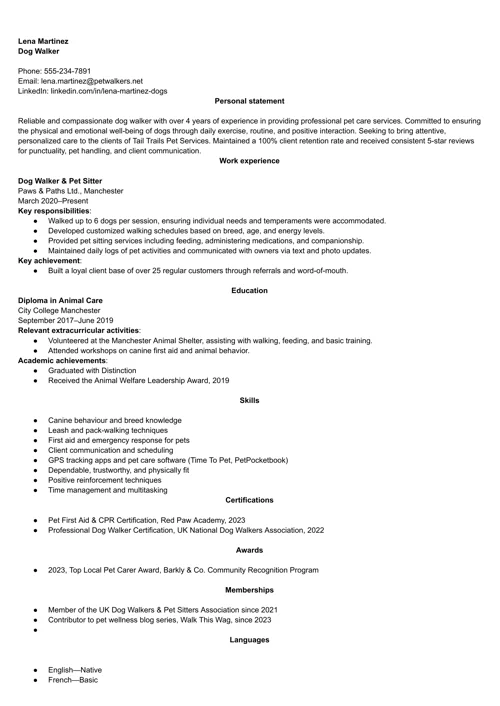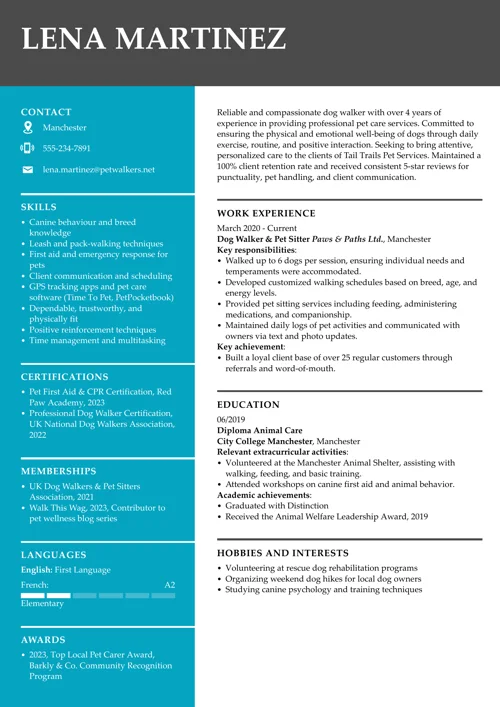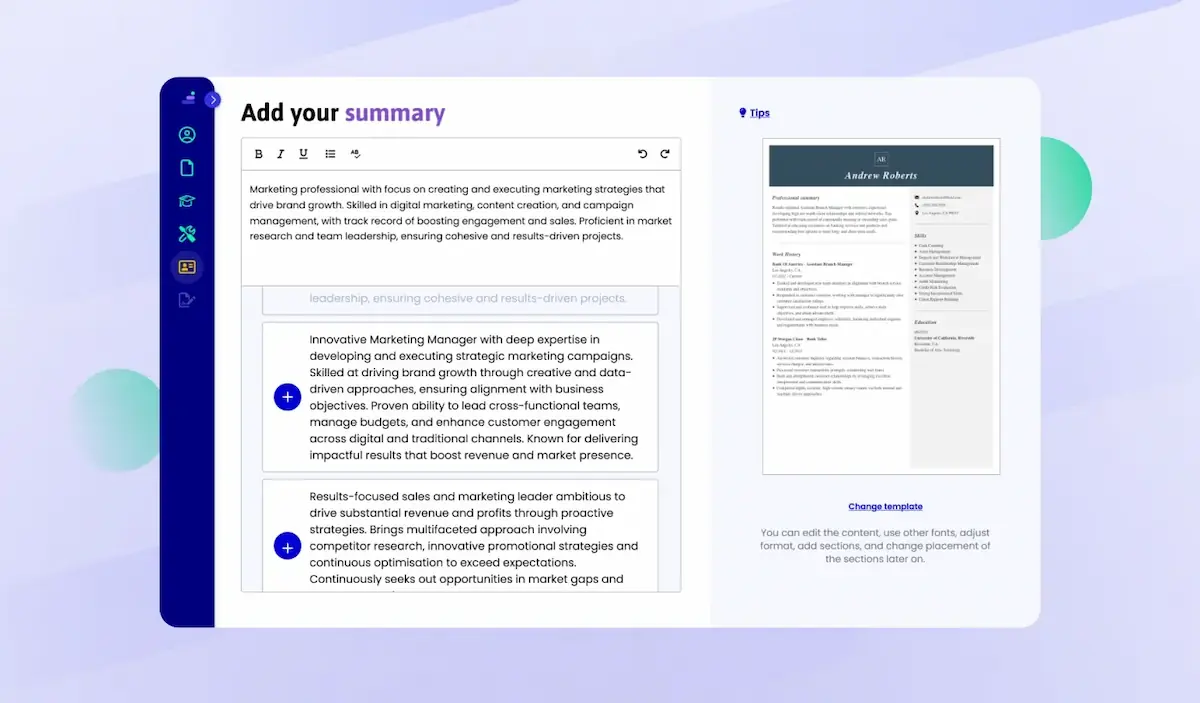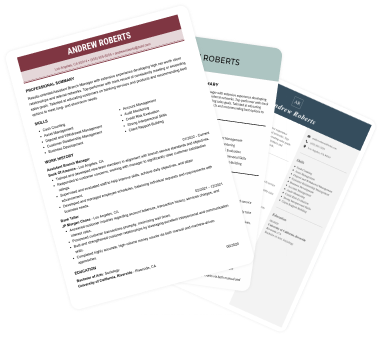Create a professional CV now!
 NO
NO YES
YESLast updated on 29 December, 2025

We all know the feeling. Whether you’ve been preparing for days or just crammed an hour before, it’s hard not to wonder how the interview went. After all, there’s another person on the other side—someone with their own perspective, seeing you through their unique lens.
Still, there are some signs an interview went well or not, and in this article, I’ll walk you through them. If you’re wondering whether you’re likely to land the job, keep reading.
Create an effective CV in minutes. Choose a professional CV template and fill in every section of your CV in a flash using ready-made content and expert tips.
Create a professional CV now!
 NO
NO YES
YESWe created the sample on the left using our builder. See other good CV examples like this one.
Need more career advice? View these guides:
Let’s dive into 20 signs that your interview went well or not so well:
You’ve just walked out of your interview with a mix of nervous energy and cautious optimism swirling in your mind. You think it went well, but there’s still that feeling of uncertainty. Did they like you? Are you moving forward?
To help ease the post-interview suspense, here are 10 signs your interview likely went well:
One of the most telling signs of a successful interview is when it runs over the scheduled time. Interviewers are often on tight schedules, so if they choose to continue the conversation, they likely see potential in you.
Did they ask follow-up questions, show genuine curiosity about your background, or even delve into the personal interests you’ve listed on your CV? They’re clearly interested in getting to know you beyond a well-written CV and assessing your suitability on a deeper level.
You’ve probably been on a date where the conversation flowed effortlessly, where hours passed without needing to search for a topic, and everything just clicked naturally. Similarly, when an interview transforms from a strict Q&A session into an open conversation, it’s a good sign. This type of exchange usually indicates mutual interest. You may notice the interviewer sharing personal insights, relating your experiences to their own, or going off-script to explore topics not initially planned. This indicates some kind of compatibility that definitely works in your favour.
If the interviewer takes time to explain the position’s responsibilities, how the team functions, upcoming projects, and the company’s goals, they’re helping you understand the broader context of the role within the organisation. When they also connect your unique work experience to their expectations, they’re actively helping you envision how you could contribute and where you might fit within the team. This is rarely done for candidates they’re not serious about.
In many companies, team introductions are not standard for every interview. If they brought in a colleague, a supervisor, or even offered a virtual tour of the workspace, it’s a strong indicator of forward momentum. It shows that they want input from others who will work with you and are starting to assess your cultural fit, not just your qualifications and professional achievements.
Logistical questions like “When could you start?” or “Do you have any upcoming vacations?” are typically reserved for the most liked candidates. This indicates that they’re already considering next steps in the hiring process and trying to align timelines. While not a guarantee, this level of specificity shows a degree of operational interest beyond just curiosity.
When the interviewer starts selling the company to you, talking about flexible work options, team retreats, leadership training, or how previous employees have been promoted, it’s often a subtle pitch. They want you to see the job as desirable, and rather than just assessing your value, they’re trying to increase their attractiveness in your eyes.
Going beyond surface-level questions and into detailed scenarios or problem-solving questions indicates a higher level of evaluation. They want to see how you think, how you’d handle real challenges, and how you’d contribute in complex situations. This is usually only done when you’ve passed the basic qualifications and are being assessed for how you’d perform in the role.
If the interviewer comments positively on specific aspects of your application—past projects, strongest skills, or a unique experience—that’s a sign they see your value. They might say things like: “That experience will be really helpful here,” or “That’s exactly what we’ve been looking for.” Such messages show you’re aligned with their needs.
Trust your instincts. If you walked away feeling confident, that your answers were well-received, and the energy in the room was positive, that’s often a reflection of how the interviewer felt, too. While not foolproof, these intuitive impressions are often supported by subtle body language cues and tone.
If the company sent a thank-you note, update, or next-steps email within a day or two, and especially if it was personalised (referencing your interview or background), it’s a great sign. Good communication signals organization, transparency, and interest—qualities most often extended to serious candidates.
A strong CV summary will convince the recruiter you’re the perfect candidate. Save time and choose a ready-made personal statement written by career experts and adjust it to your needs in the LiveCareer CV builder.

You’ve answered most of their questions, but something feels off; an unsettling intuition telling you that you might not hear from them again. Is it your gut feeling—your deep intuition—or is it just fear? Let me help you sort through those doubts.
Here are 10 signs that suggest you may not have made the cut and might not be getting an offer:
If the conversation ended quickly, especially with a vague “Thanks, we’ll be in touch” and no further discussion, it may suggest the interviewer decided early on that you weren’t the right fit. This doesn’t necessarily reflect poorly on you; in some cases, they may have already had a preferred candidate but proceeded with your interview out of courtesy or scheduling commitments. Either way, it typically reflects a swift internal decision to move forward without deeper engagement.
If the interviewer seemed disengaged—checking their watch, typing on their laptop, giving one-word responses, or appearing mentally elsewhere—it’s usually not a good sign. A disinterested demeanour may suggest they’ve already made up their mind, or they’re just going through formalities.
When interviewers don’t ask follow-up questions or dig deeper into your responses, they may not see the need to explore your potential further. This can imply that they don't find your experience relevant or compelling enough to invest more time in.
If you're facing this challenge, learn how to craft a CV with no relevant experience that still highlights your strengths and presents you as a professional.
An enthusiastic interviewer will often spend time getting you excited about the role. If the conversation stayed very generic, skipped over the team dynamics, or ignored future responsibilities, that lack of detail may indicate they don’t envision you as a good match and don’t see the point in going further.
Ending an interview without a clear explanation of what happens next can be a sign of disinterest. A strong candidate will usually be given details about timelines, upcoming rounds, or when to expect feedback. If none of that was mentioned, it may be their way of softening the eventual “no.”
When interviews feel more like a checklist than a conversation—no small talk, no connection, no personalisation—it might mean they’ve already decided you're not a top candidate they want to hire. A lack of warmth or interaction most often reflects low engagement. Still, there’s no need to take it personally; if there’s no natural chemistry, it could simply mean your communication or teamwork skills didn’t align with what the team is looking for—both of which are essential for a strong collaborative environment.
Being asked tough questions about CV gaps, lack of qualifications, or specific failure is normal. But if those became the main focus of the interview, with little effort to balance them with your strengths or successes, it could mean they were confirming doubts rather than evaluating potential.
When interviewers respond to your thoughtful questions with short, dismissive, or vague answers, it often suggests they’re not interested in building a relationship with you. It may also indicate that they don’t feel the need to “sell” the opportunity because they’ve already decided to pass.
Sometimes the tone of the room tells you everything. If the mood was tense, the interaction felt forced or unnatural, or the energy was off, trust that instinct. Interviewers often subconsciously reveal their impressions through body language and tone, even if they're trying to stay professional. This can be a strong indication that you’re no longer being considered for the role, and it may be time to redirect your efforts toward finding a job elsewhere in the UK.
If you sent a thoughtful follow-up email and received no response within the expected timeframe (or even a week beyond), it usually means they’ve decided not to move forward, even if they haven’t communicated it. While some companies ghost candidates due to organisational problems or poor internal communication, it typically reflects a quiet decision to pass. Either way, try not to dwell on it. Ghosting is unprofessional, and it says more about their process than your potential.
You don’t have to be a CV writing expert. In the LiveCareer CV builder you’ll find ready-made content for every industry and position, which you can then add with a single click.

The post-interview waiting game can be nerve-wracking, especially when trying to analyse the signals you’ve received. I hope this article has provided some clarity on how to interpret those positive and negative signs after an interview.
Our editorial team has reviewed this article for compliance with Livecareer’s editorial guidelines. It’s to ensure that our expert advice and recommendations are consistent across all our career guides and align with current CV and cover letter writing standards and trends. We’re trusted by over 10 million job seekers, supporting them on their way to finding their dream job. Each article is preceded by research and scrutiny to ensure our content responds to current market trends and demand.
Category: Career Advice
Crafting a job-winning CV is all about showcasing your unique skills and experiences. Start with a strong personal statement that highlights your career goals and achievements.
Try Our CV Builder Now